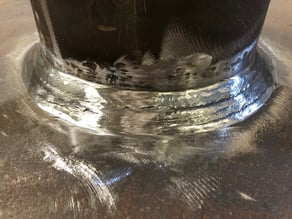Share this
What Is Heavy Fabrications And Its Uses
by Therser Sales Team on 28-Apr-2023 13:20:18
Heavy Fabrication: What Is It and Why Is It Important?
Heavy fabrication is the process of creating large and complex metal structures, such as bridges, towers, and offshore platforms, through the use of heavy machinery and specialized tools. It is a critical part of many industries, including construction, manufacturing, and energy, and plays a crucial role in building and maintaining our modern infrastructure.
The heavy fabrication process involves a number of different steps, including design, material selection, cutting, welding, bending, and finishing. Each of these steps requires specialized equipment and skilled technicians to ensure that the final product meets the necessary specifications and quality standards.
One of the key advantages of heavy fabrication is its ability to produce structures that are both strong and durable. Because these structures are often exposed to extreme conditions, such as high winds, heavy rain, and corrosive materials, it is essential that they are able to withstand these forces and remain intact over time. Heavy fabrication techniques and materials are specifically designed to provide this level of strength and durability, making them an essential part of many construction and manufacturing projects.
Another benefit of heavy fabrication is its versatility. With the use of computer-aided design (CAD) and advanced machinery, it is possible to create a wide variety of shapes and sizes, allowing for the creation of complex structures that would be difficult or impossible to produce using traditional methods. This versatility makes heavy fabrication ideal for a range of applications, from building bridges and offshore platforms to manufacturing large industrial equipment and machinery.

Of course, heavy fabrication is not without its challenges. The sheer size and weight of the structures being produced can make them difficult to transport and install, and the complex design and fabrication process requires skilled technicians with specialized training and experience. Additionally, because heavy fabrication often involves working with large amounts of metal and other materials, it can be dangerous if proper safety protocols are not followed.
Despite these challenges, heavy fabrication remains an essential part of many industries, and its importance is only expected to grow as our infrastructure needs continue to evolve. By producing strong, durable, and versatile structures that can withstand even the harshest conditions, heavy fabrication plays a critical role in building a better and more resilient future for all of us.
In conclusion, heavy fabrication is a complex and highly specialised process that plays a vital role in many industries. By leveraging advanced machinery, materials, and techniques, heavy fabrication enables the creation of structures that are strong, durable, and versatile, making it an essential part of building and maintaining our modern infrastructure. As we look to the future, heavy fabrication will undoubtedly continue to play a critical role in shaping the world around us.
Share this
- Company News (90)
- Battery Materials (41)
- kiln (37)
- fabrication (29)
- Alloy (27)
- Furnace (27)
- Welding (16)
- Industrial Kilns (15)
- Battery (13)
- Ceramic Kilns (13)
- Processes (13)
- alloy fabrication (13)
- Shuttle Kilns (12)
- RTO’s (11)
- Vacancies (11)
- Hydrogen (10)
- Therser UK (9)
- Tunnel Kiln (9)
- Refractory (8)
- Therser (8)
- Wellman Furnaces (8)
- Brickwork (7)
- Case Studies (7)
- Afterburners (6)
- Fibre Lining (6)
- electric (6)
- Almor Wellman (5)
- thermal engineers (5)
- Biochar (4)
- Exhibition (4)
- Pyrolysis (4)
- Servicing (4)
- Spares (4)
- heat treatment (4)
- History (3)
- Ceramics Uk (2)
- Combustion Control Upgrades (2)
- Nitrogen (2)
- Temperature Control Rings (2)
- gas (2)
- Certificates (1)
- Instrumentation (1)
- MMC (1)
- RHK (1)
- Roller Hearth Kiln (1)
- Test Trials (1)
- aerospace (1)
- analyser (1)
- elec (1)
- oxygen (1)
- vans (1)
- September 2025 (2)
- May 2025 (2)
- March 2025 (1)
- February 2025 (2)
- January 2025 (5)
- December 2024 (5)
- November 2024 (7)
- October 2024 (5)
- September 2024 (4)
- August 2024 (14)
- July 2024 (13)
- June 2024 (2)
- May 2024 (5)
- April 2024 (13)
- March 2024 (8)
- February 2024 (12)
- January 2024 (14)
- December 2023 (6)
- November 2023 (12)
- October 2023 (24)
- September 2023 (11)
- August 2023 (11)
- July 2023 (9)
- June 2023 (15)
- May 2023 (53)
- April 2023 (5)
- March 2023 (6)
- February 2023 (7)
- January 2023 (3)
- December 2022 (8)
- November 2022 (5)
- October 2022 (11)
- September 2022 (1)
- August 2022 (2)
- July 2022 (1)
- June 2022 (2)
- May 2022 (1)
- March 2022 (1)
- February 2022 (1)
- January 2022 (1)
- December 2021 (3)
- October 2021 (1)
- August 2021 (1)
- June 2021 (1)
- May 2021 (4)
- April 2021 (2)
- March 2021 (4)
- February 2021 (2)
- December 2020 (3)
- November 2020 (1)
- September 2020 (3)
- May 2020 (1)
- April 2020 (2)
- March 2020 (1)
- January 2020 (1)
- December 2019 (1)
- July 2019 (2)
- June 2019 (1)
- April 2019 (2)
- March 2019 (3)
- February 2019 (4)
- December 2018 (1)
- November 2018 (1)
- September 2018 (2)
- August 2018 (1)
- July 2018 (1)
- May 2018 (3)
- April 2018 (1)
- February 2018 (3)
- January 2018 (2)
- December 2017 (3)
- November 2017 (1)
- October 2017 (2)
- September 2017 (4)
- August 2017 (1)
- July 2017 (2)
- June 2017 (2)
- May 2017 (3)
- April 2017 (3)

